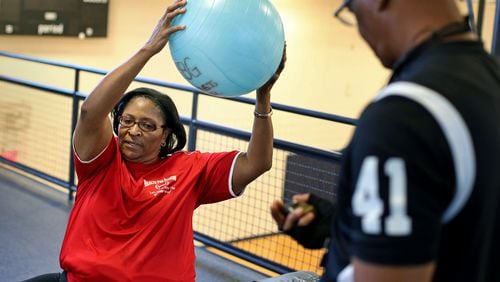COMMON SYMPTOMS OF HEART FAILURE
- Shortness of breath
- Persistent coughing or wheezing
- Swelling in the feet, ankles or abdomen
- Fatigue
- Lack of appetite
- Nausea
Source: The American Heart Association
To learn more about heart failure, visit piedmontheart.org.
Heart failure, according to the American Heart Association, affects 5.7 million Americans and causes more than 55,000 deaths in the United States each year.
Not only was Karen Wright privy to those numbers, she could very easily put a face on a great many of them.
For at least half of her life, Wright had helped care for both men and women suffering from some form of heart disease. She could list the symptoms as quickly as she could her daughters’ favorite foods.
And yet for years, when it came to her own health, the Fairburn single mom and nurse practitioner ignored her doctors and the warning signs: shortness of breath and fatigue.
Now she is on the waiting list for a heart transplant and adding her voice to the chorus of women who’ve found themselves in this awful place, hoping their story will not only help raise awareness of heart disease but serve as a warning to other women to pay attention to their bodies and respond appropriately.
Last year, Wright said, she could no longer ignore the signs she had turned a blind eye to for 10 years.
“I told my doctor, ‘Whatever you have to do, do it,” Wright said.
And so in March, Wright finally consented to having a heart pump, or left ventricular assist device, implanted to help her heart beat more efficiently.
“It’s not a permanent solution, but I feel so much better,” she said.
“There were times when I tried to tell myself it wasn’t what it was, but I knew my fatigue had nothing to do with lack of sleep,” Wright said. “Still, for some reason, I really was very resistant to getting the LVAD. Looking back, I’m glad the decision was made for me.”
For most of her life, Wright worked in a busy clinic and was very active in her daughters’ lives. She could run up a flight of stairs without blinking.
Then without warning, she found herself slowing down, struggling even to breath and feeling tired all the time, classic symptoms of a sick heart.
When she finally went to a doctor, Wright said, she was suffering from congestive heart failure. It was November 2003. She was 42 years old.
“When I couldn’t walk 30 feet without stopping, I went to see my primary care doctor who referred me to the cardiologist,” Wright said.
The moment he looked at her, Wright said, he knew.
“Your heart is really, really weak,” he told her.
That doctor prescribed medicine and suggested she make a follow-up appointment in a few weeks, but Wright never returned. She asked around for someone who was a good interventional cardiologist and found one at Emory Saint Joseph’s Hospital.
Tests showed Wright’s heart was functioning at about 15 percent its capacity. Doctors suggested she get the LVAD, but Wright refused. She hoped medicine and a pacemaker would be enough to get the miracle she needed.
“I still got tired a lot,” she said. “I had to pace myself.”
Six weeks after surgery for the pacemaker, the night before her youngest daughter’s high school graduation in 2009, she suffered a stroke.
Then as Thanksgiving approached last year, Wright was trying to take a dish from her kitchen to her car and couldn’t make it.
“I had to call the ambulance I was so short of breath,” she said.
Thus began a series of hospitalizations. Wright finally had to quit work. In March, doctors implanted the LVAD, the bridge she needed to get to a transplant.
According to the U.S. Department of Health & Human Services, African Americans are disproportionately affected by heart failure. There are 817 African-Americans awaiting heart transplants nationwide, including 30 in Georgia.
Wright, who is Jamaican, is one of them.
Why?
“Part of it has to do with the prevalence of hypertension in the African-American population,” said Dr. David Dean, heart surgeon and director of Piedmont Atlanta Hospital’s heart transplant and LVAD program.
Hypertension is so dangerous because it also leads to more diastolic heart failure, which occurs when the heart can’t squeeze enough blood out to meet the demand of the body.
“Heart failure is really pretty prevalent, with hundreds of thousands of new cases diagnosed every year,” Dean said. “The degree of heart failure can go from patients who take medication to people who are about to die and need transplant or heart pump. It’s a malignant disease, It will take your life.”
At first, Wright couldn’t get a transplant because of pulmonary hypertension.
Now that that’s under control, he said, she is an excellent candidate for transplant.
Dean said that African-Americans like Wright make up 26-30 percent of patients transplanted each year and women are highly under-served and women only about 20 percent range.
“We in the field don’t really understand why women are under-served,” Dean said. “It’s not like less women have it.”
Wright knows this for sure. Now she wants other women to know as well, particularly minority women.
“I want to encourage women to go to the doctor and don’t ignore symptoms,” she said.







